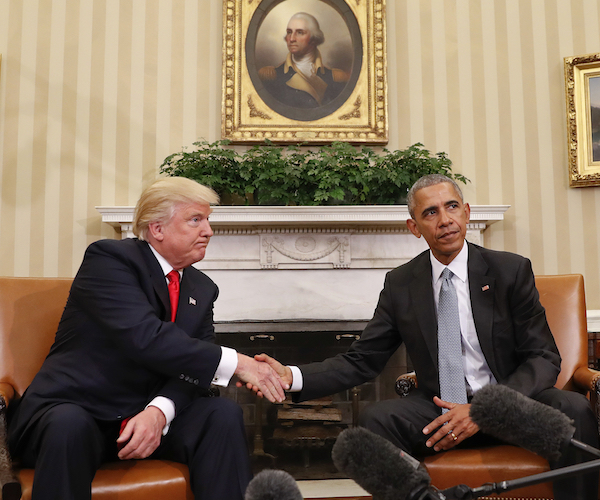President Obama and President-elect Donald Trump are engaged in a $3 billion game of chicken.
It started last week when the United Nations began considering a deeply one-sided resolution calling on Israel to end all Jewish settlement building in disputed areas of the West Bank and even East Jerusalem without a single word calling on Palestinians to end violent attacks on civilians or do anything else. Originally, the resolution was going to be introduced to the U.N. Security Council by Egypt, but President-elect Trump intervened and convinced the Egyptians to table it. Trump even tweeted about his opposition to the resolution that he said would not help the peace process and unfairly weaken Israel’s negotiation position. Those events would have been enough to make the entire affair a truly unprecedented series of events involving a president-elect and foreign affairs.
But a day later, the same resolution was resurrected by New Zealand, Malaysia, Senegal and Venezuela, and the United States made the historic decision not to use its veto power on the Council to block one-sided anti-Israel resolutions and allowed this one to pass. And that’s not all. Israel now even says it was actually the Obama administration that pushed for the resolution’s re-introduction. The White House is denying that accusation, but Israel says it has “ironclad” proof.
After the resolution passed, Trump tweeted about the U.N. again, ominously saying “Things will be different after Jan. 20th.” He followed that with a few more tweets over the weekend, including one where he slammed the U.N. as “just a club for people to get together, talk and have a good time.”
Of course, fast and furious work by an outgoing administration in its final weeks in office is nothing new in American history, especially when an opposing party’s candidate is about to take over. It’s a practice at least 216 years old, as it started when the outgoing Adams administration tried to jam through as many political appointments as possible in 1800 before the rival Jefferson administration came into power. And it’s all legal, as the incoming Jefferson team learned when it tried to suppress some of those last-minute appointments and the Supreme Court ruled it could not in the landmark Marbury v. Madison case. When the new president’s team takes office, there’s really not much it can do about any appointments, pardons, etc. made by the former president’s team. That resignation to the facts is one of the big reasons presidents from opposing parties, even in times of war, have yielded power to each other based on the results of the votes and not any coup d’etat.
But this time it’s different. At no time in history has an outgoing administration attempted to make such a radical change in foreign policy and potentially make moves that will set a potentially permanent chain reaction of events in motion. The American-Israeli alliance is one of the closest allegiances not only in U.S. history, but all modern history. If this move results in Israel only being considered a strong ally depending on who’s in the White House at any particular time, that will change everything not just for Israel but potentially all of our allies who may need to worry that a new precedent is being set by the Obama team right now.
And it’s different because this time, the incoming administration and the Republican Party are not simply faced with a series of appointments or pardons it can’t do anything about. The first response many Republicans and Trump allies are calling for is cutting or completely rescinding the massive U.S. portion of the U.N.’s annual funding, which now totals about $3 billion or about 22 percent of the international body’s overall budget. Senators Ted Cruz and Lindsey Graham are already calling for just such a funding freeze. Alabama Congressman Mike Rogers is going one step further, seeking to introduce a bill that would rescind U.S. membership in the U.N. altogether. And it should go without saying that Cruz, Graham, and Rogers are all Republicans.
Because of how unprecedented and nasty this entire affair already is, it’s really hard to believe that the Obama team’s U.N. moves are simply some kind of petulant slam against Trump.
We’ll see if President Obama makes more statements or initiates actions like calling for formal recognition of Palestine as a member state at the U.N. The historic and permanent aspect of such a move, which some in Israel are now expecting and dreading, would not be lost on anyone. This has all the makings of something that was planned for a long time, and not just a response to Trump.
But sticking it to Trump also seems like the icing on the cake from the Obama perspective. The White House seems to be daring Trump to do the very nasty work of undoing whatever it does regarding Israel and the Palestinians in these final days. That seems like an iffy bet to make since there’s been little or nothing controversial and groundbreaking Trump and many of his cabinet choices have been unwilling to say or do so far. Perhaps President Obama thinks the Trump team will be too busy fulfilling all of its other many promises to be able to handle a new paradigm in Middle East policy realities.
And that’s what’s also so troubling. Because the biggest reason why outgoing administrations haven’t worked to make big permanent foreign policy moves during the transition period is out of sheer respect for the democratic process and the incoming administration. For all the talk about all the taboos and rules Trump has broken during his election and transition process, this breach by the Obama team would be the most serious. We’re not talking about plum government jobs or a few questionable prison releases here or there; this is a move that directly affects one of the most explosive international issues of modern times. All of the Obama administration’s actions here should be done at least in consultation with the Trump team. But there’s no indication that’s happening even now.
You can make a very good argument that Trump is mostly responsible for the absolute bottom we’ve hit in America when it comes to civil political discourse. But the Obama administration’s moves in the U.N. this month are similarly trashing our traditionally decent transition process. And while it seems like this kind of policy change regarding Israel had to have been something President Obama wanted to do for some time, he had plenty of other opportunities to set it in motion at a less incendiary time. Speaking of incendiary, you’d be hard-pressed to find a more emotionally-charged foreign-policy issue other than the Arab-Israeli conflict. Why would President Obama choose this time to throw fuel on that already burning fire just as the burning dumpster fire that has been the entire 2016 election is still smoldering?
After all, this is a president who convinced the country to accept a major government overhaul of intensely personal things like health insurance and how we define marriage. Waiting until his final weeks in office to implement a major shift in policy regarding one of our closest allies doesn’t seem very prudent. And it’s making a bitterly divided and angry nation more divided and angrier than necessary.
Commentary by Jake Novak, CNBC.com senior columnist. Follow him on Twitter @jakejakeny.













